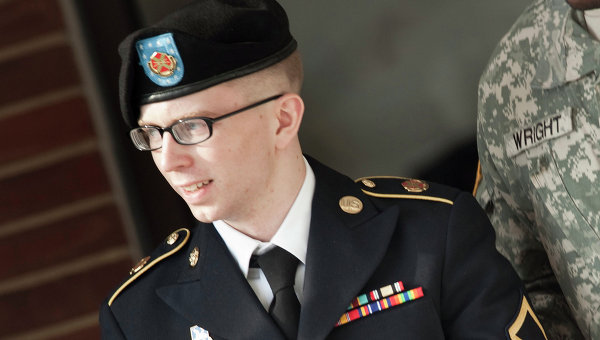MOSCOW, August 21 (RAPSI) - Bradley Manning was sentenced to 35 years in prison by a US military judge Wednesday for leaking hundreds of thousands of classified documents to the anti-secrecy group WikiLeaks, RIA Novosti reported. He was also given a dishonorable discharge from the military.
Reacting to the sentence Wednesday, Director of the American Civil Liberties Union's (ACLU) Speech, Privacy & Technology Project Ben Wizner said in a prepared statement obtained by RAPSI, "When a soldier who shared information with the press and public is punished far more harshly than others who tortured prisoners and killed civilians, something is seriously wrong with our justice system. A legal system that doesn't distinguish between leaks to the press in the public interest and treason against the nation will not only produce unjust results, but will deprive the public of critical information that is necessary for democratic accountability. This is a sad day for Bradley Manning, but it's also a sad day for all Americans who depend on brave whistleblowers and a free press for a fully informed public debate."
In July, a US military judge found Manning not guilty of aiding the enemy, but guilty of lesser charges for leaking 700,000 classified US military documents to WikiLeaks. According to advocacy group Bradley Manning Support Network’s website, prosecutors requested a 60-year prison term and a fine of $100,000. Meanwhile defense attorney David Coombs was quoted by the Support Network as having urged the judge not to rob Manning of his youth, requesting a sentence that would allow Manning to “maybe get married, maybe have children, perhaps have a relationship with his children’s children.”
Manning could have received a sentence of life in prison if convicted on the charge of aiding the enemy.
Military judge Army Col. Denise Lind found Manning guilty on five espionage counts, theft and computer fraud, his sentencing hearing is set to begin on Wednesday.
Manning had already pleaded guilty to nearly a dozen lesser charges that carry a sentence of up to 20 years in prison.
According to the Support Network’s website, Manning is accused of having leaked a video showing US soldiers killing unarmed civilians in Iraq, including a photojournalist for Reuters and his driver. He is further accused of having leaked a multitude of Army reports and diplomatic cables.
Manning was quoted as having said of the leaks, “I believed and still believe these are some of most important documents of our time,” and then of having defended his decision to disclose on the basis of having wanted to ignite a domestic dialogue on America’s war on terror. In his view, the footage needed to be seen by the American public, as its government had become “obsessed with capturing and killing people.”
Speaking of the Iraq killing video, he reportedly described the footage as “similar to a child torturing ants [with] a magnifying glass.”
The Support Network further reported that before disclosing the documents to Wikileaks, Manning had tried to leak them to several other major US media outlets. While visiting the US at one point during a tour, he had tried to pass the documents along to the Washington Post – from whom he received a rejection for lack of corroborating information, the New York Times – from whom he didn’t receive a response, and Politico – with whom he was apparently prevented from coordinating due to a blizzard. At that point, he opted for Wikileaks which, he emphasized in his statement, never pressured him to give information, thus taking full responsibility for the disclosures.
Nathan Fuller reported earlier that Manning pleaded guilty to: “having unauthorized possession of one classified Army intelligence agency memo, more than 20 classified CIDNE Iraq documents, more than 20 CIDNE Afghanistan documents, more than 5 classified documents regarding Farah, and a video (Collateral Murder). He’s also pleading guilty to willfully communicating those to an unauthorized person and that doing so was service discrediting to the Armed Forces and was prejudicial to the good order and discipline of the Armed Forces.”
He did not, however, plead guilty to those documents having related to national defense, or to having believed that their disclosure could harm the US or benefit a foreign nation, according to Fuller.



